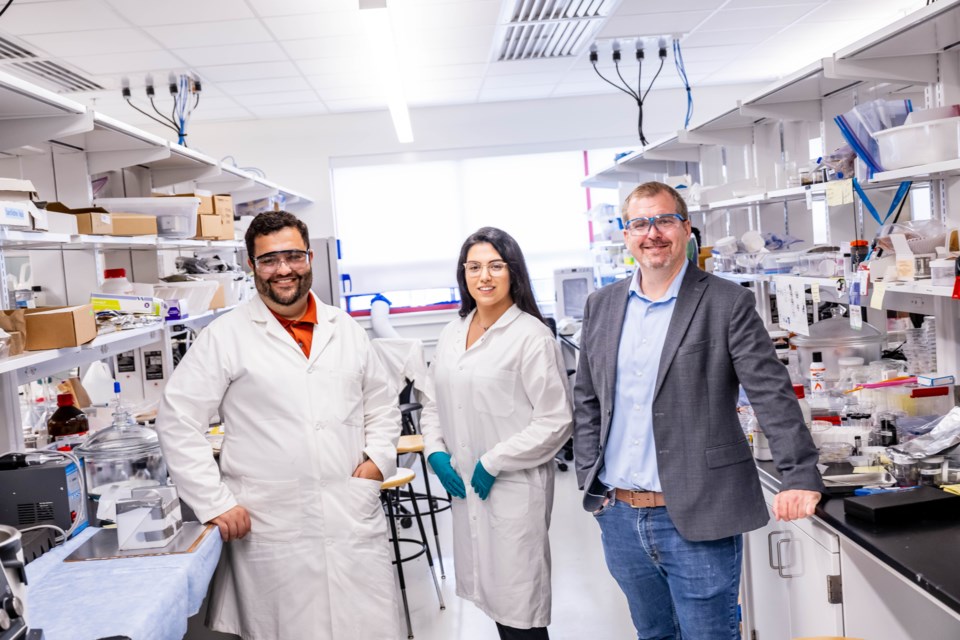A new startup spun out the University of BC’s Chemical and Biological Engineering department -- ReAct Materials -- is using wood waste to create a new type of filtration system that not only captures but also neutralizes forever chemicals.
These chemicals -- per- and polyfluoroalkyl substances (PFAS) – are extremely useful and have become almost ubiquitous, due to their unique properties of being resistant to heat, water, oil and other chemicals.
Everything from Teflon-coated pans to water resistant fabrics and fire-fighting foams contain PFAS chemicals. These chemicals are extremely persistent, taking many years to break down, and have been linked to a range of human health impacts due to their ability to accumulate in the body.
Municipal water treatment systems can filter out PFAS chemicals, but these filtration approaches do not neutralize or destroy the chemicals. One way or another, they can end up back in the environment somewhere.
For example, activated carbon that has filtered out PFAS chemicals can be heated up to evaporate the chemicals, but that just means they end up in the atmosphere.
“That’s why we’re seeing PFAS in glaciers and mountain lakes, and I just read an article recently where they found it in killer whales, so it’s getting everywhere,” said Johan Foster, associate professor of chemical and biological engineering at UBC and co-founder of ReAct Materials.
Foster and his research associates have developed an adsorption filter made from wood waste that contains a catalyst that helps breaks the chemicals down.
Foster and his colleagues received a Natural Sciences and Engineering Research Council grant to demonstrate the new approach. The process is described in a recent article in Nature.
“We were very fortunate to get a few other grants specifically to scale this process up,” Foster said.
Foster and his research team at UBC team developed an activated carbon material made from wood chips. An iron-oxide catalyst is added to the surface.
Like other activated carbon filters, it can filter forever chemicals out of water. The catalyst breaks the chemicals down into less harmful elements, such as fluoride. Ultraviolet light can enhance the process.
“The novel part about ours is that it then destroys the PFAS,” Foster explained. “There are other... technologies out there, but we think we are the first that really absorbs and destroys. The key part is the destruction. There is no system out there that destroys PFAS.”
PFAS levels tend to be found in higher concentrations in areas that produce or use the chemicals, Foster said. In Canada, for example, they have been found in elevated levels near Canadian Forces bases, where water bombers are loaded with fire retardant for fighting forest fires. PFAS are used in the chemical foams used to suffocate fires.
Foster notes that some municipalities already use activated charcoal filters in their water treatment plants.
“For those, it would be a drop-in solution,” Foster said.
Foster and his team are currently working on small water filtration systems that could be used in a single family home.
“We’re starting small,” Foster said. “We want to be able to hopefully sell smaller units in 2025. That is our first beach-head market – small systems. That could be for individual homes.”
One of the bigger markets for ReAct Materials’ filters is likely to be the U.S., where the Environmental Protection Agency has recently established new regulations for forever chemicals levels in drinking water.
“They’ve said their municipalities have five years to solve this problem,” Foster said. “They have three years to figure whether they do have a problem, and two more years to implement a solution. That was just announced earlier this year.”
Foster said ReAct Materials plans to try to raise some seed funding to start building the smaller filtration systems for sale in 2025.
“We have lab-scale prototypes, and we want to go to much bigger prototypes.”



